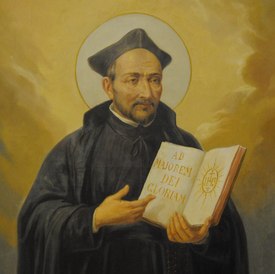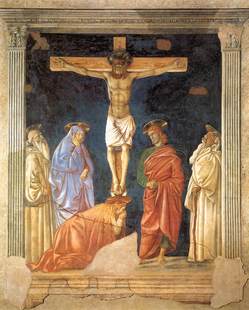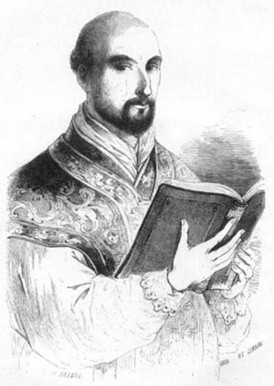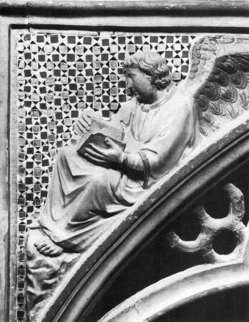” . . . the glory of God is assumed fully, without limits and determinations . . . For us, the glory of God, being our end in all its breadth, is the measure of the quest for our own salvation and perfection,
as well as for that of others.” ~Achille Gagliardi, S.J.
Tag: Ignatian Spirituality
Leading the soul to God by the method of the Ignatian Spiritual Exercises
I came across this entry in an old encyclopedia. In its brevity a lot of truth is revealed: we can work (asceticism) by reason, and the heart, to union with God. Consider for a second what the author, Fr Drum, has to teach. Also, remember that Ignatian spirituality is not the same as Jesuit spirituality. The two are not the same by any stretch of the imagination. Fr Drum tells us that it is possible through prayer and good spiritual direction to know, love and serve God in this world so as to do the same in the next. Many people today don’t have the confidence that knowing and loving and serving God is possible at all. Some don’t know that God wants our happiness today –in this life–that there is meaning to our life that includes suffering and love (& joy) and some reject the notion that we are oriented toward a final goal. Christians call this goal heaven, the Beatific vision, communion with the Trinity, etc. What else is there for the Christian who really prays and lives his or her life with the Gospel and with reason? I get the sense that they don’t have the certainty that God knows us personally and intimately, never mind having a relationship with bodiless being.
I spent many years being formed by Ignatian Spirituality. My personal, cultural, ecclesial life (taken as a unity) is informed by what Saint Ignatius of Loyola proposed in his Spiritual Exercises. But I would not be telling the whole truth if I didn’t say that other influences have had a strong influence in how I look at my life and life’s work today. My life intersects with Monsignor Luigi Giussani, Chiara Lubich, Saint Josemaria Escriva, Saints Francis & Dominic and Saint Benedict and this school of the Lord’s service. The host of women saints and blesseds are too cumbersome to note here. The point, however, is not my interpretative lens except to say that I have benefited from the Spiritual Exercises and perhaps you might think the same if you gave the Exercises a chance. They are clearly an apostolic method in the spiritual life with an incredibly strong contemplative aspect. The Exercises are not for everyone, so be patient with them if you attempt to do an Ignatian retreat.
Ultimately, what the author of this entry names as the goal of the Christian life is my own, regardless of the influences: To live is Christ. It is entirely consistent with the motto of my coat of arms seen above: sequela Christi (to follow Christ). Ignatius (and the other spiritual masters noted above) could not conceive of life any differently. Would that be the same for all people!
The entry:
The spirit of Saint Ignatius was Pauline, — intrepid yet tender; motivated by two great principles,–love of Jesus Christ and zeal for the salvation of souls. These two principles were brought together in his motto: A. M. D. G., “Omnia ad Majorem Dei Gloriam” (All for the greater glory of God). It was this spirit, which breathed in “The Spiritual Exercises,” a method of asceticism, that is the very soul of the constitutions and activities of the Society of Jesus.
This little book is said to have converted more souls than it contains letters.
Certainly the results it has produced down the centuries cannot be exaggerated. The importance of its method is proved by the mere fact that 292 Jesuit writers have commented on the whole work. The purpose of the Exercises is definite and scientific upbuilding of the reason, will and emotions, by meditation and contemplation on the fundamental principles of the spiritual life and by other exercises of the soul. First, God is rated rightly as the soul’s end and object.
Reason is convinced that God is the end for which the soul is created, and all things else are only means to bring the soul to God; hence it follows that that is good which leads the soul Godward, and that is evil which leads the soul awayward from God.
The soul’s awaywardness from God results in sin; so sin is studied both in itself and in its consequences to the soul. Secondly, Jesus Christ is put in His place in the soul, by meditations on His ideals and contemplations on His private and public life.
The soul now aspires to the very height of enthusiastic and personal love to Him; and to the most self-sacrificing generosity in following the evangelical counsels.
Thirdly, the high resolves of the soul are confirmed by the imitation of Christ in His passion. Lastly, the soul rises to a sublime and unselfish joy, purely because of the glory of its risen Lord; and leaps with rapturous exultation into the realms of unselfish and perfect love of God, such as Saint Paul evinced when he cried out: “To me, to live is Christ; to die were gain” (Philippians 1, 21).
Fr Walter Drum, SJ
The Encyclopedia Americana, 1919
Direct Experience motivates change
When the heart is touched by direct experience, the mind may be challenged to change. Personal involvement with innocent suffering, with the injustice others suffer, is the catalyst for solidarity which then gives rise to intellectual inquiry and moral reflection.
Father Peter-Hans Kolvenbach, S.J.
Former Superior General of the Jesuits, 1983-2008
New Jesuit Review
Today is the Feast of Saints Edmund Campion and Robert Southwell. It is also the launch date of a webzine venture called the New Jesuit Review — guys trying to do the right thing. So far, so good.
God bless them for their effort. Perhaps editors can attract other good Jesuits to write for them. Time will tell if they can maintain the momentum of publishing worthwhile literature, unlike some other notable Jesuit sponsored publications.
What am I doing for Christ right now?
Thinking about the life-saving cross of Jesus, I am
recalling what Saint Ignatius of Loyola taught in his Spiritual Exercises about God’s unconditional love for humanity: no talk of the mercy and love is reasonable without kneeling before the cross. This was evident to me as I walked into the chapel this morning for Lauds and forced to navigate in the
middle of the aisle a cross with relic of the True Cross before it. I knelt for a moment of prayer and kissed the relic. It is striking to do this pious gesture because it brings home to the heart, the Christian reality that the cross is so very central to our life of faith; it is the altar on which we are saved; and it is the cross that is the key which unlocks the door to the Father’s house; it is the love that kills and transcends all sin.
Loyola offers a meditation
Imagine Christ our Lord suspended on the cross before you, and converse with him in a colloquy: How is it that he, although he is the Creator, has come to make himself a human being? How is it that he has passed from eternal life to death here in time, and to die in this way for my sins?
In a similar way, reflect on yourself and ask: What have I done for Christ? What am I doing for Christ What ought I to do for Christ?
In this way, too, gazing on him in so pitiful a state as he hangs on the cross, speak out whatever comes to your mind.
A Colloquy is made, properly speaking, in the way one friend speaks to another, or a servant to one in authority – now begging for a favor, now accusing oneself of some misdeed, now telling one’s concerns and asking counsel about them. Close with an Our Father.
(Spiritual Exercises 53 and 54)
Saint Ignatius of Loyola
Whoever does not bear his own cross and come after me, cannot be my disciple.
With the Church we pray:
O God, Who for spreading the greater glory of Thy Name did, through blessed Ignatius, strengthen Thy Church militant with a new army; grant that by his aid and example we may so fight on earth as to deserve to be crowned with him in heaven.
The Litany of Saint Ignatius of Loyola
Saint Ignatius’ life in pictures
Business and Ignatian Spirituality
You won’t see me giving space to the “good work” of the Nat’l Catholic Reporter on this blog very often (almost never except for John Allen’s work) because of the NCRs frequent loyal opposition to the Church, but a recent article on the intersection of business and Ignatian Spirituality is worth noting. Read it here.
I highlight this article because I like the work of Jesuit Father Robert Spitzer, the president emeritus of Gonzaga University, Spokane, WA. Father Spitzer is a philosopher with significant grounding in faith and reason (science). He has hosted a few programs on EWTN that are very worthwhile.
The Daily Examen
The Daily Examen is a spiritual exercise on the events of the day looking to be aware of God’s presence and discern His will for us. Various recommendations exist on utilizing this gift of prayer but I think it’s necessary to do the Examen twice a day: at midday and then at the end of the day. The whole point of the Examen is to ask the three questions Saint Ignatius Loyola asked: What have I done, what am I doing and what will I do for Christ. This venerable spiritual practice of the Church helps us to see God’s hand at work in our whole experience.
Saint Ignatius of Loyola gave us a five-step Daily Examen:
1. Be aware of God’s presence;
2. Spend a moment looking over your day with gratitude for this day’s gifts;
3. Ask God to send you His Holy Spirit to help you look at your actions, attitudes, motives with honesty and patience;
4. Review your day in a particular way;
5. Have heart-to-heart talk with Jesus.
Looking at these prayer points:
More than 400 years ago Saint Ignatius Loyola encouraged his disciples to cultivate a conscious awareness of the Divine Majesty’s work in our lives. He wanted us to live vigorously in the power of the Blessed Trinity. Loyola called this awareness is what the Daily Examen.
1. Become aware of God’s presence. So often we forget that God is really present in the daily work we engage in. Here you are asked to look back on the events of the day in the company of the Holy Spirit. The day may seem confusing to you –a blur, a muddle. Ask God to for the grace of clarity and understanding. Wherever you are, you are a creature in the midst of the beauty of creation. As you quiet yourself, become aware that God is present within you, in the creation that surrounds you, in your body, in those around you. Ask the Holy Spirit to let you look on all you see with love.
2. Be concrete and let the important moments of the day come to mind! In a general way give a moment of reflection on what happened to you. Some people will recall the smell of morning coffee, the laugh of a friend, the fragrance of a flower, or the feelings brought forth by a kind word, or what you’ve learned. Consider what you received and what you gave.
3. Give thanks to God for favors received. This is an opportunity to appreciate the permanent gifts you have that allow your participation in this day; conversely recall your particular strengths in times of difficulty. God the Father gives you these to draw you into the fullness of His life. As you move through the details of your day, give thanks to God for His presence in matters large and small. “When the Spirit of truth comes he will guide you into all truth.” (John 16:13) The Holy Spirit inspires you with the gift of growing freedom in your life. Here the freedom the Holy Spirit offers to us allows us to look upon yourself without condemnation and without complacency and thus offering us the opportunity to change, to grow. Ask that you will learn and grow as you reflect, thus deepening your knowledge of self and your relationship with God.
4. Recall the events of your day; explore the specific context of your actions. Search for the internal movements of your heart and your interaction with what was before you. Ask the Lord to show you the moments of grace and sin based on what you experienced since the last time you did the Examen. In what ways did you accept the Spirit’s gifts and in what ways did you resist the Holy Spirit? As the Psalmist says, we have a divided heart. The Examen shows us the areas of this division –the wavering of the heart between helping and disregarding, scoffing and encouraging, listening and ignoring, rebuking and forgiving, speaking and silence, neglecting and thanking. Remember, the Examen is not a time to dwell on your sin and other shortcomings; rather, it is a loving look with the Lord at how you have responded to God’s gifts. The idea is to notice where you acted freely, that is, cooperated with grace–the picking a particular course of action from the possibilities you saw. See where you were swept along without freedom. What reactions helped or hindered you? See where Christ entered your decisions and where you might have paused to receive His influence. “Test yourselves,” Sain Paul urges, “to see whether you are living in faith; examine yourselves. Perhaps you yourselves do not realize that Christ Jesus is in you.” (2 Cor.) Thus, you will come to know that Jesus Christ is with you. Christ continually invites you to love Him and your neighbor as yourself; He will strengthen you to do this.
5. Seek God’s guidance. Ask Him for help and understanding. Pray for hope. Speak with Jesus about your day, about your concerns. Share your thoughts on your actions, attitudes, feelings and interactions. You may feel the need to seek forgiveness, to ask for direction, to share a concern, to express gratitude, etc. Express sorrow for sin; give thanks for grace, the enlightening presence of God, and especially praise God for the times you responded in ways that allowed you to better see God’s life. Resolve with Jesus to move forward in grace-filled action.
You might like to finish your time with the Lord’s Prayer and the Glory be.
First Principle and Foundation: a fundamental spiritual teaching of Loyola
The goal of our life is to live with God forever. God who loves us, gave us life. Our own response of love allows God’s life to flow into us without limit.
All the things in this world are gifts of God, presented to us so that we can know God more easily and make a return of love more readily.
As a result, we appreciate and use all of these gifts of God insofar as they help us develop as loving persons.
But if any of these gifts become the center of our lives, they displace God and so hinder our growth toward our goal.
In everyday life, then, we must hold ourselves in balance before all of these created gifts insofar as we have a choice and are not bound by some obligation.
We should not fix our desires on health or sickness, wealth or poverty, success or failure, a long life or short one.
For everything has the potential of calling forth in us a deeper response to our life in God.
Our only desire and our one choice should be this: I want and I choose what better leads to the deepening of God’s life in me.
Saint Ignatius of Loyola
Spiritual Exercises (a new trans.)
Daily Rule of Prayer: Mass, adoration, lectio divina…
For the most part, the time for priestly and diaconal ordinations have come and gone. Where I am for the summer, a newly ordained priest is due to arrive in a few days. Having heard plenty of ordination homilies over the years none are as insightful as Benedict XVI’s especially when he proposes a plan to be spiritually fit. Of course, all what is said is not restricted to priests but applicable to the laity as well. All of us reading this post are familiar with all the points made about developing a prayer life and seeing them together constitutes a serious plan. Father Mark draws our attention to one item that is near-and-dear to many of us: lectio divina. I am re-posting a portion of my friend Father Mark’s recent May blog entry because I think it’s helpful.
What is Father Everypriest’s daily Rule of Prayer according to Pope Benedict XVI? Let’s consider the elements of the Rule in the order in which the Holy Father presents them.
1) Daily Holy Mass. Daily. Not 6 days week, not 5, or 4 days a week, but daily. The liturgical cycle in its hourly, daily, weekly, and yearly rhythms is given us precisely to facilitate our “abiding” in Christ hour by hour, day by day, week by week, and year after year. Integral to the liturgical cycle is daily Holy Mass. The Eucharistic Sacrifice sends the divine lifeblood coursing through one’s spiritual organism. Without daily Mass, the priest will succumb to spiritual anemia.
2) The Liturgy of the Hours. The Hours give rhythm and grace to daily life. They are a school of discipline (discipleship), a supernatural system of irrigation channeling grace into every moment of the day, a privileged way of offering thanks in communion with all who, “in heaven, on earth, and under the earth,” confess the Name of Jesus and bend the knee before Him. A priest who loves the Divine Office will enjoy an interior life that is sane, and sound, and wholly ecclesial. Fidelity to the Divine Office refines the Gifts of the Holy Spirit, sharpens one’s discernment, and imparts to everything the priest does a certain Eucharistic and doxological quality.
3) Eucharistic Adoration. Are you surprised? Eucharistic adoration has known a kind of springtime since The Year of the Eucharist (2004-2005) that was also the year of the death of Pope John Paul II and of the election of Pope Benedict XVI. Two Americans known for loving their brother priests and ministering to them tirelessly –Archbishop Fulton J. Sheen and Father Gerald Fitzgerald of the Holy Spirit– insisted on a daily hour before the Blessed Sacrament as a sine qua non of priestly spirituality. The priest who adores the Blessed Sacrament exposes his weaknesses and wounds to the healing radiance of the Eucharistic Face of Jesus. Moreover, he abides before the Eucharistic Face of Jesus as the representative of his people: of the sick, the poor, the bereaved, and of those locked in spiritual combat. The priest who looks to the Eucharistic Face of Jesus, and draws near to His Open Heart in the Sacrament of the Altar, will, just as the psalm says, be radiant, and he will not be put to shame.
4) Lectio Divina. Again — a monastic thing? No, a Catholic thing. The quality of a priest’s preaching is directly proportionate to his commitment to lectio divina. Neglect of lectio divina leads to mediocre preaching. Opening the Scriptures is like opening the tabernacle: therein the priest finds the “hidden manna” his soul craves. The four steps of lectio divina can be accommodated to any length of time: 1) lectio, i.e. the Word heard; 2) meditatio, i.e. the Word repeated; 3) oratio, i.e. the Word prayed;
4) Contemplatio; i.e. the indwelling Word. Lectio divina cannot be occasional;
it is not a random pursuit. Learn to say, “I am not available.” Get over feeling guilty about taking time for God!
5) Holy Rosary. Yes, the daily Rosary. It’s a spiritual lifeline that has saved many a priest from spiritual shipwreck. The brilliant and holy exegete and founder of the École biblique in Jerusalem, Father Marie-Joseph Lagrange, was observed praying fifteen mysteries of the Rosary each day, and asked, “Why, Father, do you, a great exegete, need to pray the Rosary?” “Because, ” he answered, “it decapitates
pride.” I would add that not only does the Rosary decapitate pride; it decapitates each of the seven capital sins: pride, greed, lust, anger, gluttony, envy, and sloth. With the passing of the years I have come to appreciate the profound wisdom of an old Dominican priest to whom I used to make my confession years ago. Invariably, after confessing my miseries, Father would ask, “Do you say the Rosary, son?” And invariably I would reply, “Yes, Father.” And then he would say, “Aye, then you’ll be alright.” A priest who prays the Rosary daily will be alright and, almost imperceptibly, will grow in purity and humility.
6) Meditation. Meditation can mean many things, even within our Catholic tradition. It is integral to the prayerful celebration of Holy Mass and the Hours. “it nourishes Eucharistic adoration. It is the second “moment” of lectio divina. It is the soul of the Rosary. In my own experience, meditation is related to “remembering the things the Lord has done.” Saint Gertrude the Great, a model of the mystical life grounded in the liturgy, used to say, “A grace remembered is a grace renewed.” Understood in this sense, meditation, by recalling the mercies of the Lord in the past, infuses the present with hope, and allows the priest to go forward with a holy boldness.
Is it necessary to set a period of time apart for meditation as such? That depends on whom you ask. The Carmelite, Jesuit and Sulpician traditions would hold fast to some form of meditation as a daily exercise. The monastic tradition has, on the whole, taken a more supple approach to meditation. It is a daily practice, but one diffused in every form of prayer, including the liturgy itself. One learns to pace one’s prayer, to pause, to breathe, to linger over a phrase, a word, or an image. Whether one espouses the Ignatian way or the monastic approach, meditation is an integral to every priest’s daily Rule of Prayer.





